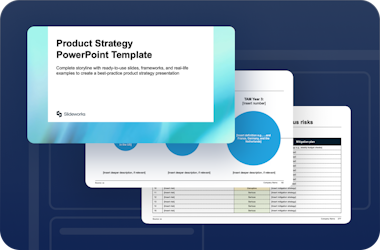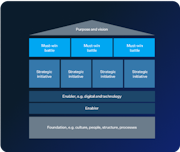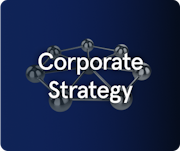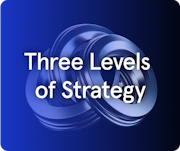Strategy Templates
Here you will find ready-to-use PowerPoint and Excel strategy presentation templates to quickly and easily create business strategy PowerPoint presentations like top-tier management consultants.
Strategy Presentation Resources
Strategy toolbox
Tips and tricks on creating presentations
Strategy Templates FAQs
The most common questions we've heard around business strategy and strategy templates
Q: What is the business model of a company?
A: The business model means the way a company plans to win in its market. In other words, the business model is the outline of which customers you want to go after and how you plan to create, deliver, and capture value from these customers.
Q: What is a good business model?
A: A good business model is one that is clear on how a company will create a competitive advantage in its market (e.g., through more efficient operations, a better value proposition, serving niche customer segments etc.) and where the components of the business model (customer segments, solutions/products, go-to-market, pricing etc.) are cohesive and build on each other.
Q: What is the difference between business strategies and business models?
A: Business models focus on how companies create competitive advantages in their markets. Business strategies are long-term plans that outlines how the company will achieve its goals and objectives, guiding its direction and resource allocation. Business models are typically a section of the overall strategy.
Q: Why is a business model important?
A: A business model is important because it tells you which customers you want to go after and how you plan to create, deliver, and capture value from these customers. It gives you clarity on what your competitive advantage is and serves as blueprint for your day-to-day activities. Without a business model you have no focus and will waste time and money on non-value adding things.
Q: What is the business model canvas?
A: The business model canvas is a practical one-page way to view your entire business model. It lays out both your go-to-market strategy in terms of customer segments, value proposition/solutions offered to your customers, how you will reach them etc., how you will internally be able to deliver on that strategy in terms of key activities, partners etc., and finally how you plan to make money on that strategy in terms of cost structure and revenues.
Q: What is business model innovation?
A: Business model innovation means changing one or more elements of a company's business model. In practice, this means simultaneously and synergistically modifying both an organization's value proposition to customers and its underlying operating model to enhance the competitive advantage and value creation.
Q: What is a business plan?
A: A business plan is a comprehensive document crafted to detail a company's objectives and the strategies and tactics it plans to employ to achieve those objectives.
Q: What is a business strategy?
A: A business strategy is the same as a strategy. It is a high-level plan designed to achieve specific long-term goals or objectives. It's the direction and scope of an organization over the long term, which achieves advantage in a changing environment through its configuration of resources.
Q: How to present business strategy?
A: A business strategy can have many different formats but typically include an assessment of the current situation, goals for the next time horizon, key initiatives to reach those goals, and a roadmap for implementation of those initiatives. You can see some essential elements of a strategy plan here or real-life, full-length strategy presentations here.
Q: What are strategy PowerPoint templates?
A: Strategy PowerPoint templates are ready-to-use business strategy templates where you can fill in your own information. Big consulting companies like McKinsey and BCG typically have internal libraries of templates to use. At Slideworks, we've created strategy presentation templates based on the classic McKinsey style that you can find here.
Q: What are business strategies examples?
A: There are many examples of business strategies. The renowned strategy scholar Michael Porter typically talks about three archetypes;
Cost Leadership:
- Aiming to be the lowest-cost producer in the industry.
- Achieving cost efficiency through economies of scale, efficient processes, and cost control.
- Offering products or services at competitive prices to a broad market.
Differentiation:
- Seeking to be unique in the industry in ways that are valued by customers.
- Focusing on product innovation, quality, brand image, or other distinctive features.
- Charging premium prices for the unique features and attributes.
Focus (or Niche) Strategy:
- Concentrating on a specific market segment, niche, or target audience.
- Customizing products or services to meet the needs of the chosen segment.
- Achieving either cost leadership or differentiation within the targeted market.
Q: What are the types of business strategy?
A: There are many types of business strategies. See the question above for some examples.
Q: What does a business strategy look like?
A: A business strategy can have many different formats but typically include an assessment of the current situation, goals for the next time horizon, key initiatives to reach those goals, and a roadmap for implementation of those initiatives. You can see some essential elements of a strategy plan here or real-life, full-length strategy presentations here.
Q: What does business strategy mean?
A: A business strategy is the same as a strategy. It is a high-level plan designed to achieve specific long-term goals or objectives. It's the direction and scope of an organization over the long term, which achieves advantage in a changing environment through its configuration of resources.
Q: What is a business strategy consultant?
A: A business strategy consultant is a person who comes in to a company to help management formulate their new strategy. This typically involves both analyzing the current situation, suggesting the path forward, identifying key initiatives, laying out a plan for implementation including estimated resource need, and getting feedback from all layers of the organization on all these aspects along the way. The strategy project most often ends in a succinct strategy document.
Q: What is the difference between business strategy and business model?
A: A business model focus on how a company creates a competitive advantage in their market. A business strategy is a long-term plans that outlines how the company will achieve its goals and objectives, guiding its direction and resource allocation. Business models are typically a section of the overall strategy.
Q: What makes a good business strategy?
A: A good business strategy lays out a clear and compelling path forward for a company to achieve its goals including distinct choices of what to focus on and what not to focus on. See more on what a best-practice strategy looks like here.
Q: Why is a business strategy important?
A: A business strategy is important because it sets the overall direction and focus on an organization. Without a business strategy, companies run the risk of wasting time and money on non-value adding activities and most often fail to create a sustained competitive advantage, which means they are eventually outpaced by their competitors.
Q: What is strategy?
A: Strategy is a high-level plan designed to achieve specific long-term goals or objectives. It's the direction and scope of an organization over the long term, which achieves advantage in a changing environment through its configuration of resources.
Also referred to as: business strategy, corporate strategy
Q: What is the difference between the three levels of strategy?
A: The three typical levels of strategy are corporate, business unit/level, and functional. See more on each level here.
Q: What is the difference between corporate strategy and business strategy?
A: The two can be used interchangeably for smaller companies. For large, diversified companies business strategy refers to the competitive strategy employed by a business unit or stand-alone business in a portfolio. Corporate strategy is the overall portfolio strategy. You can think of corporate strategy as answering the question "which businesses should we be in" and business strategy answering the question "how do we win in this business". See more in our article here.
Q: Are business unit and business level strategy the same?
A: Yes.
Q: Business level strategy vs corporate level strategy?
A: Business level strategy refers to the competitive strategy employed by a business unit or stand-alone business in a portfolio. Corporate level strategy is the overall portfolio strategy. You can think of corporate level strategy as answering the question "which businesses should we be in" and business level strategy answering the question "how do we win in this business". See more in our article here.
Q: What is corporate strategy?
A: Corporate strategy can mean both a business strategy and a corporate level strategy. Corporate strategy in a diversified company means the overall portfolio strategy. You can read more here.
Q: What is business unit strategy?
A: A business unit strategy is a competitive strategy, meaning it focuses on how to create and sustain a competitive advantage. The major components of this are things like customer segments, value proposition, go-to-market strategy, pricing strategy etc. See more in our article here.
Q: What is a strategic business unit?
A: A strategic business unit (SBU) is a profit center that concentrates on specific product offerings and targeted market segments. SBUs generally operate with their own distinct strategies in terms of marketing plans, competitive analyses, and marketing campaigns, even when integrated into a larger corporate structure.
Q: What are the major components of business unit strategy?
A: A business unit strategy is a competitive strategy, meaning it focuses on how to create and sustain a competitive advantage. The major components of this are things like customer segments, value proposition, go-to-market strategy, pricing strategy etc. See more in our article here.
Q: What is a strategic plan?
A: A strategic plan is a document outlining an organization's strategy for achieving its goals and mission over a certain time frame. It provides a roadmap for the organization, detailing the actions, resources, and timelines required to achieve these objectives. See the five essential elements of a strategy document here.
Also referred to as: corporate plan, strategic planning document
Q: What are strategic alternatives in a business plan?
A: Strategic alternatives mean different directions a company can take in their strategy. It is typically on major things like including or excluding certain customer segments or product categories, or deciding which markets to be in or how aggressive a market expansion should be. Strategic alternatives in strategy documents from consulting firms like McKinsey and BCG are most often presented as 3-5 options with a base case, and some aggressive and less aggressive options.
Q: What is a strategy framework?
A: A strategic frameworks is a structured tool or set of guidelines used to help an organization develop a strategic plan. Frameworks provide a way to organize and analyze information, set priorities, and make strategic decisions. Common consulting frameworks include Balanced Scorecard, McKinsey's Strategic Horizons, BCG Growth-Share matrix, McKinsey 7S, and Seven Degrees Framework.
Also referred to as: strategy toolkit, strategic methodology
Q: What are core competencies?
A: Core competencies are the unique strengths or capabilities of an organization, which provide particular competitive advantages. Derived from the combination of pooled knowledge and technical capacities, these competencies distinguish a company in the marketplace.
Q: What is differentiation?
A: Differentiation means the process of distinguishing a product or service from others to make it more appealing to a target market, through e.g., superior or unique features. It's a competitive strategy that businesses use to gain an advantage over competitors.
Q: What is market segmentation?
A: Market segmentation is the process of dividing a broad target market into distinct subsets of consumers who have common needs, preferences, or characteristics. The goal is often to design specific strategies or propositions tailored to each segment (or to focus on certain segments instead of the entire market).
Q: What is a mission statement?
A: A mission statement is a brief description of an organization's fundamental purpose. It clarifies why the organization exists and what it aims to achieve. A mission statement is not a goal and does not usually have a time frame attached to it.
As an example, Nike's mission statement is “to bring inspiration and innovation to every athlete in the world.”













